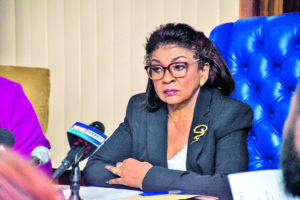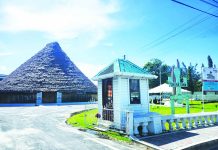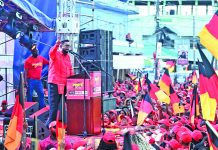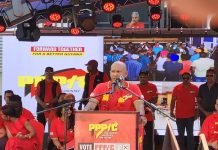APNU/AFC petition to stop declaration
…court to rule on Monday
The Appeal Court will, on Monday, hand down its judgement in the case seeking to block the Chief Elections Officer from presenting the results of the March 2 General and Regional Elections. The declaration which the APNU/AFC is attempting to block would see People’s Progressive Party/Civic’s (PPP/C) Dr Irfaan Ali being Guyana’s ninth Executive President.

The Notice of Motion filed by A Partnership for National Unity/Alliance For Change (APNU/AFC) supporter, Eslyn David, named Chief Elections Officer (CEO) Keith Lowenfield; GECOM Chair (retired) Justice Claudette Singh; the Guyana Elections Commission, and Attorney General of Guyana as respondents.
On Friday at the case management hearing, the Appeal Court granted permission for several political parties – the People’s Progressive Party/Civic (PPP/C), the three-joiner parties: A New and United Guyana (ANUG), Liberty and Justice Party (LJP) and The New Movement (TNM); as well as The Citizen Initiative (TCI) and Change Guyana (CG) – to join the proceedings as respondents.
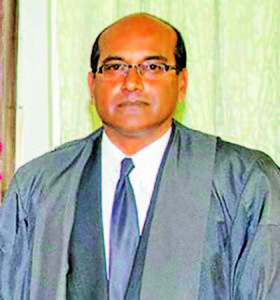
The case is being presided over by Appellate Justices Dawn Gregory and Rishi Persaud along with High Court Judge Brassington Reynolds.
On Saturday, the attorneys for the applicant, respondents and the joint parties to the proceedings presented their oral submission via Zoom conferencing.
Leading the applicant’s defence is Trinidad and Tobago’s Senior Counsel John Jeremie and supported by Mayo Robertson, Keith Scotland and APNU/AFC candidate Roysdale Forde.
During Saturday’s proceedings, SC Jeremie argued that his client is seeking that the court interprets the Constitution and determine whether more votes cast can be considered as more valid votes cast. David’s application was filed pursuant to Article 177 (4) of the Constitution of Guyana.
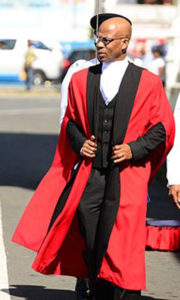
Article 177 (4) states: “The Court of Appeal shall have exclusive jurisdiction to hear and determine any question as to the validity of an election of a President in so far as the question depends upon the qualification of any person for election or the interpretation of this Constitution; and any decision of that Court under this paragraph shall be final.”
In oral submissions to the court, he furthered that on the issue of jurisdiction, the court it rightly empowered by Article 177 (4). He added that what they are seeking, in principle, is an interpretation of the Constitution.
Jeremie told the court that the Elections Commission has the power to invalidate votes and that is exactly what CEO Lowenfield did, when he revised the figures of the National Recount to reflect what he deemed to be ‘valid’ votes, but added that the CEO is now being prevented from doing that. He urged the court to grant his client the relief being sought so as to ensure that the results of the elections are credible.
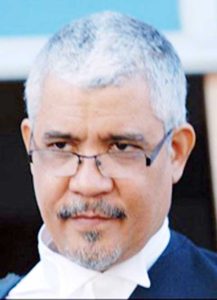
In response to the written submission by Counsel for the applicant, attorney for PPP/C’s Presidential Candidate, Dr Irfaan Ali, and General Secretary, Bharrat Jagdeo, Trinidadian Senior Counsel Douglas Mendes argued that the Appeal Court has no jurisdiction to hear the case since the question of credibility is best addressed via an elections petition in the High Court.
This argument was supported by the smaller parties as well as the Chair of GECOM, who via attorney Kim Kyte urged the court to dismiss the matter forthwith since it is misconceived. She identified that the application speaks to the declaration of Dr Ali as President but reminded that the seat is still being occupied by David Granger.
Justice Reynolds sought clarification from Kyte on whether the recount order sought to establish credibility to which she responded in the affirmative but furthered that it is still a matter for the High Court since the Appeal Court can only interpret the Constitution and not the recount order.

She argued that the recount order cannot alter the Constitution of Guyana to give GECOM the power to determine the credibility of an elections and as such noted that she and her client believes that the issue can be ventilated via an election petition.
In her written submission to the court, Kyte submitted that the duty of the court is not to re-write the Constitution but to interpret what is already stated in the Constitution clearly. The words themselves best declare the intention of the framers.
She argued that Article 177 (4), under which the Notice of Motion was filed, clothes the Court of Appeal with a “narrow special exclusive jurisdiction” to hear and determine any question as to the validity of an election of a President in so far as that question turns upon the qualification of any person for election or the interpretation of this Constitution.
Mere allegations
Dr Ali’s lawyer, Senior Counsel Mendes told the court that GECOM has considered the APNU/AFC’s allegations of anomalies (dead and migrated person voting) but pointed that the Commission has identified that it cannot vest itself the power to investigate and nullify the elections.

Kim Kyte
He added that Lowenfield went beyond his boundaries when he sought to determine the credibility of the elections and revise the figures from the National Recount.
Lowenfield in his summary report to GECOM had used the unsubstantiated allegations made by the APNU/AFC of dead and migrated voters to disenfranchise thousands of Guyanese and provided figures, which he concluded were credible. His calculation awarded the coalition 125,010 votes and the PPP/C 56,627 votes.
Kyte in her submissions questioned if GECOM is to embark on this credibility exercise then what basis should be used to determine the issues of validity and credibility. Meanwhile, Mendes posited that the allegations of anomalies are exactly what they are – mere allegations.
